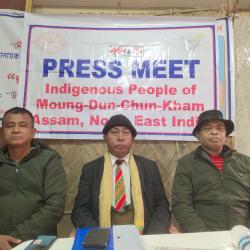Just a month before December 2007 UN Conference on Climate Change opens in Bali, Yifat Susskind has linked research on agrofuels to his suggestion, demonstrating the serious dangers associated with agrofuel production. Yet, Jean Ziegler, the UN Special Rapporteur on the right to food, recently proposed that we impose a moratorium on the development of agrofuels, an idea that has generated controversy in some circles.
With biofuels being touted as our best great hope to undo climate change, it would be easy to ask yourself, "What's not to like?" Biofuels, proponents claim, will counter our global dependence on fossil fuels and help curb carbon emissions. But this "greening" of our energy sources is not all that green. A growing group of human rights and environmental activists point to the dangers that biofuels pose to environmental sustainability and the livelihoods of communities around the world, and call for a major shift: a moratorium on biofuels.
Most of the policies being put forward envision substituting biofuels for fossil fuels without reducing our overall consumption of energy. These proposals are backed by agribusiness, biotech companies, and oil interests that are now investing billions in ethanol and biodiesel plants, plantations of soy, corn, sugarcane, and palm oil, as well as genetically engineered trees and microbes for future supplies of cellulosic ethanol.
The prefix "bio" suggests that "biofuels" are natural, renewable, and safe—an appealing thought to those concerned with the toxic and unsustainable use of fossil fuels. But agrofuels (as they are known in Latin America) are not easily renewable because the Earth's landmass is itself a finite resource. To produce even seven percent of the energy that the US currently gets from petroleum would require converting the country's entire corn crop to ethanol.
If we don't reduce the demand for energy by consuming less, we risk a scenario in which most of the Earth's arable land will be dedicated to growing "fuel crops" instead of food crops. People concerned about this danger use the term agrofuels to highlight the impact that biofuels have on the world's food supply. Growing agrofuels on a mass scale is already jacking up food prices, depleting soil and water supplies, destroying forests, and violating the rights of Indigenous and local people in areas newly designated as "biofuel plantations." Agrofuels are a false solution to climate change because they:
Violate Land Rights: Agrofuel plantations in Brazil and Southeast Asia are being created on the territories of Indigenous Peoples who have traditionally lived in and protected these ecosystems. Indigenous Peoples and local subsistence farmers—most of whom are women—are being displaced. People are being forced to give up their land, way of life, and food self-sufficiency to grow fuel crops for export. Often, plantation workers face abuse, harsh working conditions, and exposure to toxic pesticides. In Brazil, some soy farms rely on debt peonage workers—essentially modern-day slaves.
Worsen Hunger: Agrofuel expansion threatens to divert the world's grain supply from food to fuel. We know that when economic demand increases, costs rise. That means staple foods like corn will become more expensive. Already in June 2007, the United Nations reported that, "soaring demand for biofuels is contributing to a rise in global food import costs." The principle of supply and demand also means that less people will grow food because "fuel crops" will be worth more. Already, small-scale farmers in Colombia, Rwanda, and Guatemala feel compelled by global trade rules to grow luxury crops such as flowers and coffee for export while their families go hungry. Given the amount of land that would be required to "grow" enough fuel to maintain the global economy, the threat of worsening hunger and land rights abuses is grave. According to the Rainforest Action Network, the crops required to make enough biofuel to fill a 25-gallon SUV tank could feed one person for a year.
Worsen Global Warming: Agrofuels don't necessarily reduce the greenhouse gas emissions that cause global warming—especially if they are produced in unsustainable ways. For example, currently, the most common method of turning palm oil into fuel produces more carbon dioxide emissions than refining petroleum. Agrofuel production has made Indonesia (where 40 percent of the population does not have electricity) the third-largest emitter of greenhouse gases in the world.
Worsen Deforestation and Threaten Biodiversity: Corporate plans for expanding biofuel production involve destroying forests and other ecosystems to create massive plantations that rely on chemical fertilizers and toxic pesticides to maximize production. Monoculture (single crop) plantations of soy and palm oil are being established in the rain forests and grasslands of Asia and South America, threatening some of the most biodiverse ecosystems on Earth. Clear-cutting forests to plant agrofuels also adds to warming by eliminating carbon-absorbing forests.
Why is Energy a Women's Issue? In most of the Global South, women are responsible for collecting household fuel for cooking, lighting, and other family needs. Most of this energy is derived from natural resources such as wood, charcoal, or dung. When fuel is made scarce—for example, by deforestation or drought—women's and girls' workloads increase sharply. In some communities, women spend many hours a day collecting fuel.
So What's the Alternative? Jean Ziegler, the United Nations Special Rapporteur on the right to food has called for a five-year ban on agrofuel expansion. A moratorium on the conversion of land for agrofuel production should be accompanied by the development of new energy technologies that do not compromise global food security.
We need sustainable solutions to climate change, not corporate solutions that seek to simply shift our energy addiction from one resource to another. We need to consume less, not just differently, and steer clear of solutions that would expand the reach—and all the pitfalls—of industrialized agriculture. Creative and practical solutions for meeting our energy requirements—including some local, sustainable biofuel programs—are being developed around the world. We can support proposals for developing sustainable renewable energy sources, while recognizing the need to reduce overall consumption and protect human rights—including everyone's basic right to food.
Yifat Susskind
The author is MADRE's Communications Director. MADRE is an international women's human rights organization. More information about MADRE's Food for Life Campaign can be found at madre.org
[Citizen News Service]
- 10778 reads










Add new comment